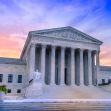Conservative think tanks and politicians have long maligned the scope of federal agency authority. Bemoaning the “administrative state,” they believe that more decisions should be left up to Congress and fewer to regulatory agencies. Advocates for administrative authority counter that Congress is ill-equipped to handle regulation and enforcement, necessitating agencies to fill in the gap. Opponents of the administrative state were recently handed a huge victory by the conservative supermajority on the U.S. Supreme Court. In West Virginia v. EPA, the Court found that the Environmental Protection Agency exceeded its authority under the Clean Air Act by setting emissions caps in the Clean Power Plan that would have forced energy producers to shift to cleaner energy sources, such as wind, solar, and natural gas.
The Court’s decision turned on the application of the recently-minted “major questions doctrine.” According to the major questions doctrine, “decisions of vast economic and political significance” may not be assigned to federal agencies without a clear statement from Congress. Agencies cannot infer their authority on areas of great national importance from any “ambiguous statutory text.” Instead, such authority must be clearly granted by statute.
The doctrine is typically traced back to a 2000 Supreme Court decision in FDA v. Brown & Williamson Tobacco Corp. The Court there held that “given the economic and political significance of the tobacco industry … it is extremely unlikely that Congress could have intended to place tobacco within the ambit of the Food and Drug Administration’s regulatory jurisdiction.” The Court has expanded the doctrine in several decisions since, although it continues to hold that the doctrine is meant for extreme cases touching on areas of national significance.
With regard to the EPA, the Court found the Clean Power Plan represented a significant shift in the EPA’s actions. Whereas it previously enacted rules aimed at promoting the “best system of emission reduction” by setting enforceable rules governing existing sources, the Clean Power Plan was aimed at using emissions caps to shift power production away from coal and toward cleaner sources entirely. That level of systemic change, the Court decided, was beyond the EPA’s authority granted under the Clean Air Act.
The rub, of course, is determining what constitutes a “major question.” Agencies with years of experience regulating particular arenas cannot be trusted to decide which areas fall within their purview. Instead, courts will sort of “feel it out” to determine if something has historically been within an agency’s purview and whether it concerns a matter of great “economic and political significance.” As argued by Justice Kagan in her dissent: “In rewriting that text, the Court substitutes its own ideas about delegations for Congress’s. And that means the Court substitutes its own ideas about policymaking for Congress’s.”
Notably, opponents of the decision also argue that the case should not have been heard at all. The Clean Power Plan was repealed in 2016 under the Trump Administration. The EPA has not reenacted the Plan, nor has it stated any intention to do so. Federal courts are not meant to issue advisory opinions on what might happen if something else should possibly happen; there must be an actual injury that has occurred or that is imminent. The Court dismissed this justiciability argument, explaining that “voluntary cessation does not moot a case” unless it is “absolutely clear that the allegedly wrongful behavior could not reasonably be expected to recur.” Because the government might possibly have decided to reimpose emissions limits should the case have been resolved in its favor, the Court was willing to hear the matter. Opponents claim that the Court went out of its way to take a moot case in order to impose its will upon the administrative system.
There’s likely to be significant fallout from the ruling. The Court is clearly skeptical of any agency claiming authority not explicitly conferred in existing statutes. Any agency rule that appears to touch on issues of national significance may find itself under attack and deemed a “major question” outside of its authority sans explicit statutory approval.






